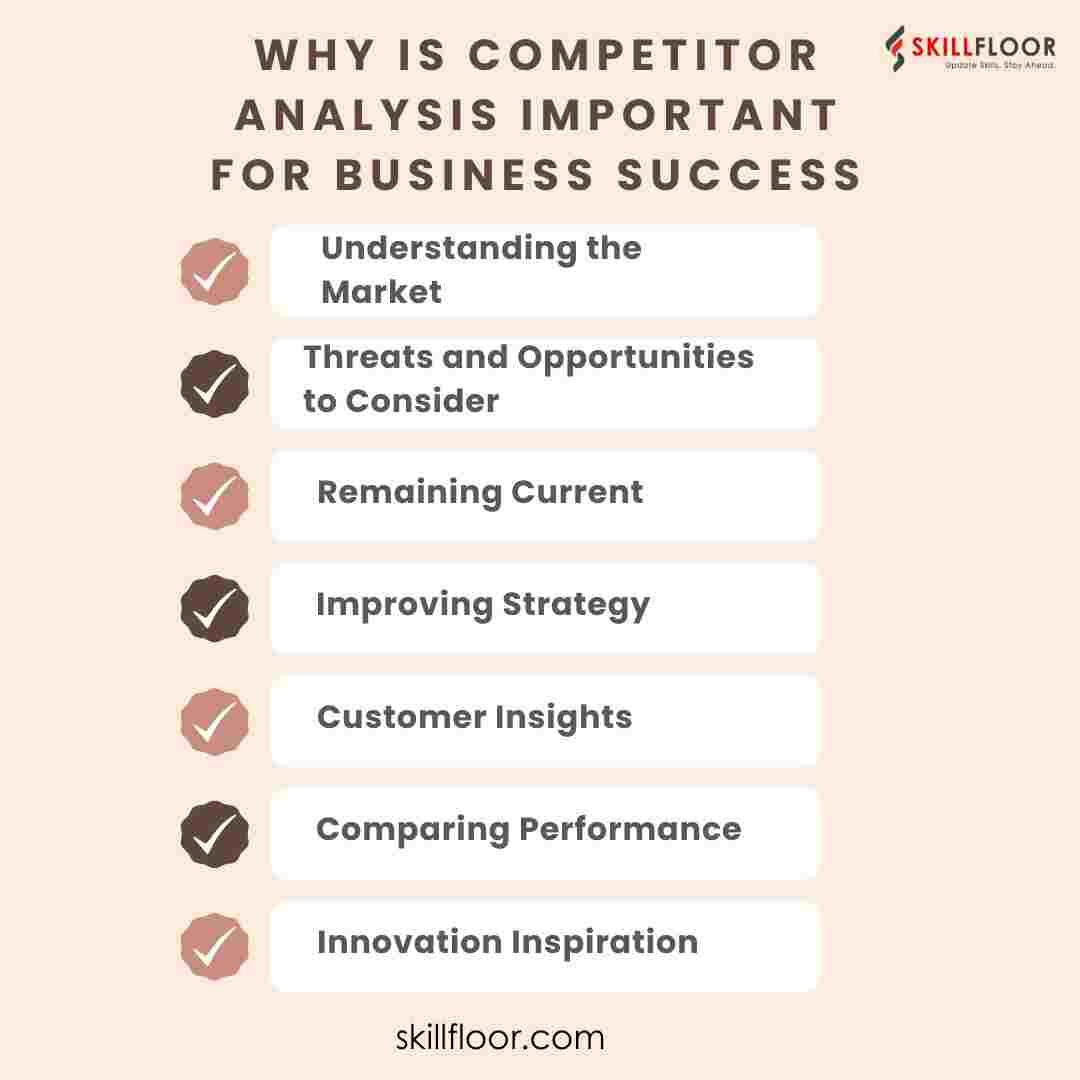Importance of competitor analysis and how to conduct
Discover how to effectively conduct competitor analysis to gain insights, refine strategies, and stay ahead in the competitive landscape of digital marketing.

Competitor analysis involves evaluating the strengths, weaknesses, opportunities, and threats (SWOT) of rival businesses in your industry. It's a strategic process that helps you understand how your competitors operate, their advantages, and where they might be vulnerable. SWOT analysis is a structured approach to dissecting these elements, giving you insights into your competition's position in the market. Competitor analysis in digital marketing involves closely examining rival businesses to understand their strategies and performance. This includes studying their websites, social media presence, SEO tactics, content, ads, reviews, and overall reputation. By identifying competitors' strengths and weaknesses, businesses can refine their marketing strategies and capitalize on opportunities in digital marketing. Regular monitoring ensures staying competitive and adapting to changing market dynamics.
how to conduct competitor analysis
Analysing your competitors in digital marketing can provide valuable insights into their strategies and help you identify opportunities for improvement and growth. Here's a simplified seven-step process to conduct competitor analysis:
-
Identify Your Competitors: Start by listing your direct competitors - those who offer similar products or services to yours. Additionally, consider indirect competitors who may not offer the same products but target a similar audience or fulfil the same needs.
-
Analyze Their Online Presence: Visit your competitors' websites and social media profiles. Take note of their website design, user experience, content quality, and engagement levels on social media platforms. Pay attention to the tone and messaging they use to communicate with their audience.
-
Assess Their Content Strategy: Examine the type of content your competitors are creating and sharing. Look for blog posts, videos, infographics, and other content formats they use to attract and engage their audience. Evaluate the frequency of content Marketing and the topics they cover.
-
Evaluate Their SEO Strategy: Use tools like SEMrush or Ahrefs to analyze your competitors' search engine optimization (SEO) efforts. Identify the keywords they are targeting, their backlink profile, and their website's domain authority. This information can help you understand how they rank in search engine results pages (SERPs).
-
Review Their Social Media Activity: Monitor your competitors' social media accounts to understand their social media marketing strategies. Look at the type of content they share, the frequency of posts, and their engagement metrics such as likes, comments, and shares. Pay attention to which platforms they are most active on.
-
Examine Their Paid Advertising: Investigate whether your competitors are running paid advertising campaigns on platforms like Google Ads, Facebook Ads, or LinkedIn Ads. Analyze their ad copy, creatives, targeting options, and landing pages. This can provide insights into their messaging and targeting strategies.
-
Gather Customer Feedback and Reviews: Look for customer reviews, testimonials, and feedback about your competitors' products or services. This can help you understand their strengths and weaknesses from the perspective of their customers. Pay attention to recurring themes or issues mentioned in the reviews.
Challenges in Competitor Analysis
Data Availability: It can be difficult to find thorough and reliable information about rival businesses, particularly if those businesses are privately held or work in uncontrolled sectors.
Data rightness: It can be challenging to guarantee the correctness and usefulness of data, even when it is available. Erroneous analysis may result from obsolete, disadvantaged, or incomplete data that comes from multiple sources.
Competitive Intelligence Collection: It can be difficult to get competitive intelligence while following industry rules and regulations ethically and legally. The kinds of information that can be gathered and the techniques employed to do so might be restricted.
Competitor Complexity: Rivals may have intricate business plans, compete in a variety of markets, or provide a broad range of goods and services. It can be difficult to understand the subtleties of rivals' business practices and strategic plans.
Data Translation: Correctly analyzing and understanding competitor data calls for knowledge and experience. Poor data interpretation or incorrect insights can result in poor strategic choices.
Dynamic Market Environment: As a result of shifting customer tastes, competitive dynamics, and technology breakthroughs, markets are always changing. It can be difficult to stay on top of these changes and modify competitor analysis as necessary.
Competition Reaction: It can be challenging to foresee competitors' actions and precisely gauge their impact when they respond to market shifts or strategic initiatives undertaken by your company.
Why is competitor analysis important for business success?

Understanding the Market: By giving organizations information about what other companies are doing, what products they are offering, and how they are reaching customers, competitor analysis helps in understanding the market in which they operate.
Threats and Opportunities to Consider: Businesses can identify dangers and chances to take advantage of weaknesses in the competition or market gaps by doing competitor analysis. Additionally, they can recognize possible dangers from rivals who might be acquiring an advantage.
Remaining Current: Businesses may remain relevant in a market that is undergoing rapid change by keeping a watch on their competitors. Businesses may stay competitive and satisfy changing client needs by responding to the strategies and innovations of their rivals.
Improving Strategy: By studying the achievements and failures of rival companies, firms can use competitor analysis to improve their strategy. This might involve boosting marketing methods, expanding product offerings, or modifying price plans.
Customer Insights: Gaining knowledge about rivals' clients and methods of interaction might help you better understand the tastes and actions of your target audience. Businesses can use this information to guide their own recruitment and retention digital campaigns.
Comparing Performance: Companies can evaluate their relative position in the market by comparing performance measures with those of their competitors. This evaluation helps in identifying areas for improvement and helping to create realistic targets.
Innovation Inspiration: Studying what competitors are doing might help a company innovate by generating fresh concepts and methods. Studying what rivals are doing can inspire innovation and motivate companies to develop original solutions to issues.
Competitor analysis in digital marketing is a crucial strategic process that offers invaluable insights into the competitive landscape. By systematically evaluating the strengths, weaknesses, opportunities, and threats of rival businesses, organizations can refine their marketing strategies, identify growth opportunities, and stay ahead in the dynamic market environment. Conducting competitor analysis involves several steps, including analyzing the online presence, content strategy, SEO efforts, social media activity, paid advertising, and gathering customer feedback. However, challenges such as data availability, accuracy, and interpreting complex competitor data must be addressed. Despite these challenges, competitor analysis remains indispensable for business success, as it enables organizations to understand the market, identify threats and opportunities, stay current, improve strategy, gain customer insights, compare performance, and find inspiration for innovation., incorporating competitor analysis into digital marketing strategies is essential for businesses aiming to thrive and succeed in today's competitive Environment.



























































